Exaltation of the Holy Cross
No Classes; All Students on Campus
No Classes; All Students on Campus
(No classes; All students on campus)
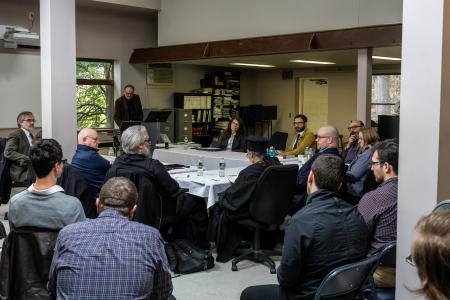
On March 17, 2022, the Institute of Sacred Arts (ISA) hosted several distinguished scholars and artists to reflect together on the theme, “Tradition and Innovation in the Arts of the Orthodox Church.” This event, conceived and led by Dr. Rossitza Schroeder (associate professor of art history), was inspired by the residency of iconographer Dr. George Kordis, whose art and writings directly address themes surrounding creativity, tradition, and innovation.
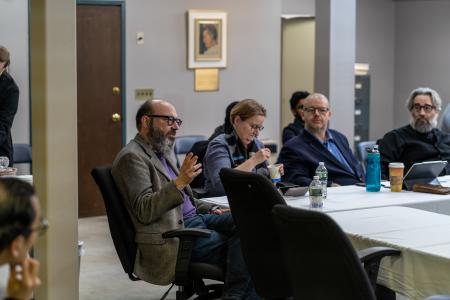
Speakers at the academic roundtable were Fr. Chrysostomos Nassis, a liturgist and canonist at Aristotle University in Thessaloniki; Alexander Lingas, a musicologist at City, University of London and director of Cappella Romana; Karin Krause, an art historian at the University of Chicago; Vasileos Marinis, a scholar of sacred architecture and hagiography at Yale University; Maria Evangelatou (remote), an art historian at the University of California, Santa Cruz; and Olga Yunak, art historian at the Graduate Theological Union in Berkeley.
Additionally, the ISA welcomed among the informed guests Fr. Silouan Justiniano of the Monastery of St. Dionysios (Long Island, NY), himself an iconographer and frequent contributor to the Orthodox Arts Journal (see his report of this event), and Richard Barrett, director of grants and publications for Cappella Romana. Seminary Academic Dean Dr. Ionuţ-Alexandru Tudorie, together with several faculty members from St. Vladimir’s, attended the event as did around sixteen seminarians.
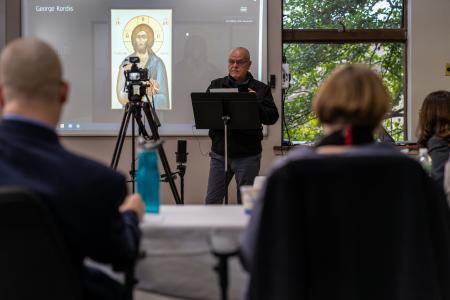
The papers represented a broad temporal and geographical span—from the ninth to the twenty-first century, and from Novgorod and Constantinople to New York. The topics ranged from issues of iconographic novelties and creative solutions in Byzantine psalters, the interpretation of innovation and tradition in Orthodox musical practices, the flourishing of individual artistic styles in the peripheries of the Orthodox commonwealth, contemporary architectural church building, and the effects of digitization on the liturgy.
After the delivery of papers and discussion among participants, Dr. Kordis closed the event with a presentation of his own, entitled “Tradition and Innovation: The Theology of Rhythm as a Guide in a Sea of Creative Possibilities.”
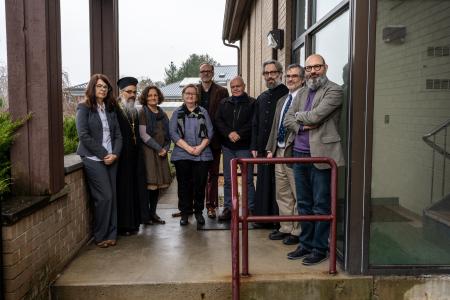
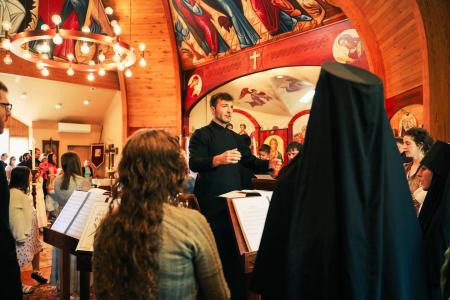
Seminarians, faculty, staff, and community members of St. Vladimir's Orthodox Theological Seminary (SVOTS) celebrated a beautiful Holy Week and Pascha together the week of April 17–24, 2022. Photos were taken throughout the week on campus by Seminarian Andrew Prather and SVOTS' Chief Marketing Officer Sarah Werner.
Christ is risen! Truly He is risen!
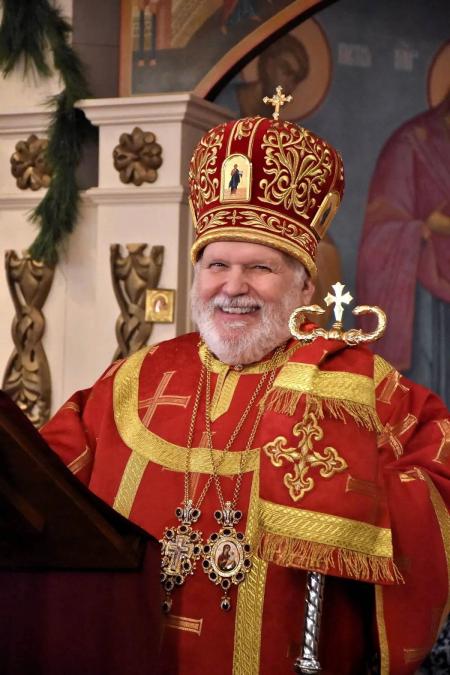
On the Feast of Feasts, Great and Holy Pascha, Sunday, April 24, 2022, His Eminence, the Most Reverend Paul (Gassios), archbishop of Chicago and the Midwest, fell asleep in the Lord at the age of 69 after a grave illness. Archbishop Paul, an alumnus of St. Vladimir's Seminary, was the ruling hierarch of the Diocese of the Midwest of the Orthodox Church in America (OCA) from 2014 until his repose.
Paul Nicholas Gassios was born in Detroit, Michigan on April 6, 1953 to Nicholas and Georgia Gassios, natives of Castanea, Greece.
As an infant, he was baptized with the name Apostolos, in honor of the holy Apostle Paul, at Ss. Constantine and Helen Greek Orthodox Church, Detroit, MI, his home parish for the first twenty-eight years of his life.
He graduated from Detroit’s Cooley High School in 1971, where he was a member of the National Honor Society, after which he enrolled at Wayne State University (WSU) as a history and psychology major. After graduating in 1976, he worked with emotionally and physically abused children. He received a Master of Social Work degree from WSU in 1980, and continued to work in his chosen field.
In the mid-1980s, he became a member of Holy Transfiguration Church, Livonia, MI. He began theological studies in September 1991 at St. Vladimir’s Orthodox Theological Seminary, Yonkers, NY, from which he received his Master of Divinity degree summa cum laude and served as valedictorian in 1994. He was ordained to the priesthood by His Eminence, the late Archbishop Job of Chicago and the Midwest, on June 25, 1994.
After ordination, he was assigned priest-in-charge of St. Thomas the Apostle Church, Kokomo, IN, which he served until June 2005, after which he resided at St. Gregory Palamas Monastery, Hayesville, OH until May 2006. He briefly served as Rector of Archangel Michael Church, St. Louis, MO and the Nativity of the Holy Virgin Church, Desloge, MO before his transfer to the OCA’s Bulgarian Diocese and assignment as Dean of St. George Cathedral, Rossford, OH in 2007. In August 2014, he was named Administrator of the Diocese of the Midwest and relocated to Chicago.
On October 20, 2014, he was tonsured to monastic rank with the name Paul, in honor of St. Paul the Confessor, Patriarch of Constantinople. On October 21, 2014, the Holy Synod elected him to fill the vacant Episcopal See of Chicago and the Diocese of the Midwest.
Archimandrite Paul was consecrated to the Episcopacy and enthroned as bishop of Chicago and the Midwest at Chicago’s historic Holy Trinity Cathedral on Saturday, December 27, 2014. Concelebrating at the Consecration Liturgy were His Beatitude Metropolitan Tikhon; His Eminence, Archbishop Nathaniel of Detroit and the Romanian Episcopate; His Eminence, Archbishop Benjamin of San Francisco and the West; His Eminence, Archbishop Melchisedek of Pittsburgh and Western Pennsylvania; His Eminence, Archbishop Nicolae of the Romanian Orthodox Archdiocese in the Americas; His Grace, Bishop Irénée of Ottawa and Canada; His Grace, Bishop Michael of New York and New Jersey; His Grace, Bishop Alexander of Toledo and the Bulgarian Diocese; and His, Grace Bishop David of Sitka and Alaska. On Thursday, May 28, 2020, he was elevated to the rank of archbishop.
His archpastoral tenure in the Midwest was only seven years but filled with great progress and accomplishment for the diocese. From an administrative perspective, he was known for prompt replies and calls when his clergy contacted him. He was very organized and thoroughly followed the established procedures with attentiveness. He actively attended diocesan, deanery, and parish meetings guiding the progress of the discussed topics.
He established new ministries within the diocese that focused on building up the communities within the diocese which include: the Mother Maria of Paris Ministry–Department of Charitable Efforts, Department of Family Life, Saint Andrew of Crete Music Ministry, and the Department of Youth. These were four areas he saw to be important pillars to building up the Body of Christ.
With a prioritization of pastoral visits, he was often on the road traveling each weekend to visit a different community within his vast diocese. He often reflected that this was the most enjoyable part of his ministry and gave him something to look forward to each week. In addition to leading the services when making archpastoral visits, he would make time to be with clergy and their families to hear about their life and struggles. He would gather with youth and parish councils to lead discussions on the faith and other topics of interest. He made annual visits to the seminaries to visit with the diocesan seminarians and their families and actively encouraged vocation within his parishes.
His genuineness is unforgettable, and his smile brought joy to those around him. His sermons were impactful and memorable for those who were blessed to hear them.
He is fondly remembered throughout the diocese and at his alma mater as a loving shepherd for his flock.
May Archbishop Paul’s memory be eternal!